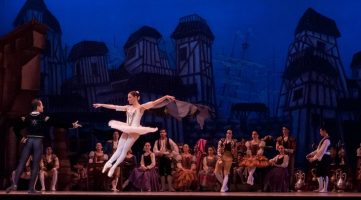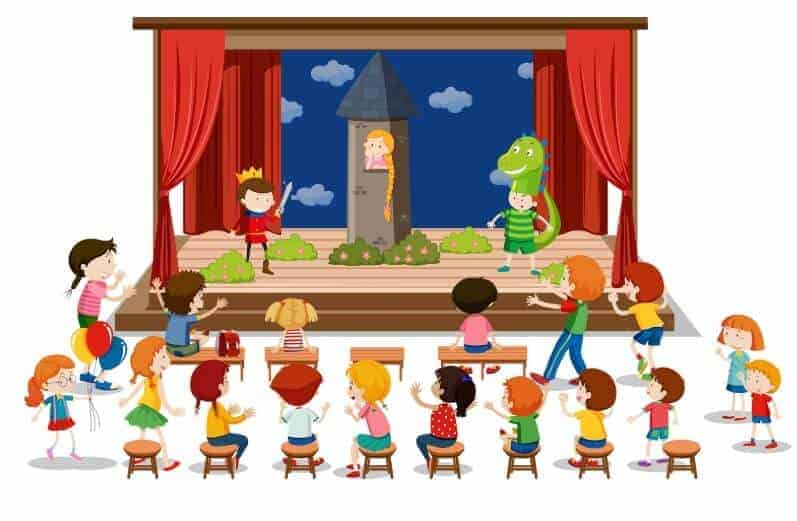

Unit 11 :
Theater 劇場類



Vocabulary
Let’s learn about the different vocabulary of theater.
Part 1
1. opera /ˈɑː.pɚ.ə/
(n.)歌劇
a musical play in which most of the words are sung, or plays and music of this type
an opera singer
歌劇演唱家
2. audition /ɑːˈdɪʃ.ən/
(n.)(演員、樂手、舞蹈演員等的)試鏡;試奏;試唱;試演
a short performance that an actor, musician, dancer, etc. gives in order to show they are suitable for a particular play, film, show, etc.
(v.)(使)試鏡;(使)試奏;(使)試唱;(使)試演
to give a short performance in order to show that you are suitable for a part in a film, play, show, etc., or to make someone do this
His audition went well and he’s fairly hopeful about getting the part.
他試鏡時表現出色,很有希望能獲得這個角色。
3. Broadway /ˈbrɑːd.weɪ/
(n.)(紐約街名,劇場集中地)百老匯;百老匯式的劇場
a street in the entertainment district of New York, where there are many theaters or the type of theater in this area
a Broadway play/musical
百老匯戲劇/音樂劇
4. cast /kæst/
(n.)(一部電影、戲劇或演出的)全體演員
the actors in a film, play, or show
(v.)分配…扮演(某角色),為…選派演員
to choose actors to play particular parts in a play, film, or show
He was often cast as the villain.
他經常演反面角色。
5. character /ˈker.ək.tɚ/
(n.)(電影、戲劇或故事中的)人物,角色
a person represented in a film, play, or story
The film revolves around three main characters.
電影圍繞三位主角展開。
6. chorus /ˈkɔːr.əs/
(n.)合唱團,歌詠隊
a group of people who are trained to sing together
He sings with the Los Angeles Gay Men’s Chorus.
他在洛杉磯男同性戀合唱團演唱。
7. denouement /deɪˈnuː.mɑ̃ː/
(n.)(故事的)結局,結果
the end of a story, in which everything is explained, or the end result of a situation
8. monologue/ˈmɑː.nə.lɑːɡ/
(n.)獨角戲
a short play for one actor
9. rehearsal/rəˈhɝː.səl/
(n.)排練,排演,試演
a time when all the people involved in a play, dance, etc. practice in order to prepare for a performance
He’s a producer with three plays in rehearsal.
他是個製片人,他的三部劇現在都在排演中。
10. footlights /ˈfʊt.laɪts/
(n.)(舞臺上的)腳燈
a row of lights along the front of a stage at a theater
Exercise 1
Circle the word that has the same meaning.
- a short play for one actor
monologue drama opera
- a person represented in a film, play, or story
audition character chorus
- a musical play in which most of the words are sung, or plays and music of this type
opera chorus monologue
Part 2
11. performer/pɚˈfɔːr.mɚ/
(n.)表演者;演出者;演員
a person who entertains people by acting, singing, dancing, or playing music
He’s a brilliant performer.
他是個出色的演員。
12. audience /ˈɑː.di.əns/
(n.)觀眾;聽眾;讀者
the group of people together in one place to watch or listen to a play, film, someone speaking, etc.
She lectures to audiences all over the world.
她向世界各地的聽眾發表演講。
13. scenery /ˈsiː.nɚ.i/
(n.)(劇院的)舞臺佈景
the large painted pictures used on a theater stage to represent the place where the action is
14. playwright /ˈpleɪ.raɪt/
(n.)劇作家
a person who writes plays
15. prologue /ˈproʊ.lɑːɡ/
(n.)(戲劇的)開場白,開場詩,引子
a part that comes at the beginning of a play, story, or long poem, often giving information about events that happened before the time when the play, story, or poem begins
16. applause /əˈplɑːz/
(n.)掌聲
the sound of people clapping their hands repeatedly to show enjoyment or approval of something such as a performance or speech
His speech met with (= received) loud applause.
他的講話贏得熱烈的掌聲。
17. focus /ˈfoʊ.kəs/
(n.)(尤指注意力或興趣的)中心,焦點
the main or central point of something, especially of attention or interest
I think Dave likes to be the focus of attention.
我覺得戴夫喜歡受人關注。
18. apron /ˈeɪ.prən/
(n.)(舞臺)臺口
part of a stage in a theater that is in front of the curtain
19. amphitheater /ˈæm.fəˌθiː.ə.t̬ɚ/
(n.)(露天)圓形劇場(或競技場)
a circular or oval area of ground around which rows of seats are arranged on a steep slope, for watching plays, sports, etc. outside
20. backstage /bækˈsteɪdʒ/
(adj.)(adv.)後臺的,幕後的;在後臺,在幕後
in the area behind the stage in a theater, especially the rooms in which actors change their clothes or where equipment is kept
We went backstage after the show to meet the actors.
演出結束後我們去後臺跟演員們見面。
Exercise 2
Choose the correct answer.
- J.K. Rowling became a _____ when she penned Harry Potter and the Cursed Child.
a) audience b) playwright c) singer - Tickets to the concert were less expensive since the venue was an outdoor ___.
a) store b) restaurant c) amphitheater - There was great ___ when the speaker sat down.
a) amazing b) applause c) apply
Part 3
21. downstage /ˈdaʊn.steɪdʒ/
(adj.)(adv.)向舞臺前部(地);在舞臺前部(地)
towards or at the front of the stage in a theater
22. offstage /ˌɑːfˈsteɪdʒ/
(adj.)不在舞臺上的,臺後的,幕後的
off the stage, or happening behind or at the side of the stage, so that people who are watching cannot see
The main characters are offstage for most of the second act.
第二幕的大部分時間主角都沒有上場。
23. upstage/ˈʌp.steɪdʒ/
(adj.)(adv.)向舞臺後部(的);在舞臺後部(的)
towards or at the part of a theater stage that is furthest from the people watching the performance
He looks upstage to where the body is lying.
他向舞臺後部屍體躺著的地方看去。
24. wings /ˌkʌn.tri ˈdæns/
(n.)(舞臺的)側面
the sides of a stage that cannot be seen by the people watching the play
I was in the wings waiting for my cue to come on stage.
我站在舞臺的側面,等待上臺的提示。
25. dresser /ˈdres.ɚ/
(n.)(劇組的)服裝員,服裝師
a person who works in the theater or in films, helping the actors to put on their clothes
26. melodrama /ˈmel.əˌdræm.ə/
(n.)情節劇
a story, play, or film in which the characters show stronger emotions than real people usually do
a television melodrama 一部電視情節劇
27. mime /maɪm/|
(n.)默劇
a short play without speech
(v.)以默劇的形式表演
to act or tell a story in mime
The whole of the banquet scene is mimed.
整個宴會的場景是以默劇的形式演繹的。
28. tragedy/ˈtrædʒ.ə.di/
(n.)悲劇(作品)
a play about death or suffering with a sad end, or this type of play generally
Shakespeare’s tragedies include “Hamlet”, “King Lear”, and “Othello”.
莎士比亞的悲劇作品包括《哈姆雷特》、《李爾王》和《奧賽羅》。
29. musical /ˈmjuː.zɪ.kəl/
(adj.)音樂的;用於音樂的
related to or connected with music
(n.)音樂劇;音樂(影)片
related to or connected with music
musical instruments 樂器
30. script /skrɪpt/
(n.)電影劇本;劇本;廣播稿;講稿
the words of a film, play, broadcast, or speech
(v.)為(電影、戲劇、廣播或演講等)寫稿
to write the words of a film, play, broadcast, or speech
Exercise 3
Describe to your tutor what you see in this pictures.




